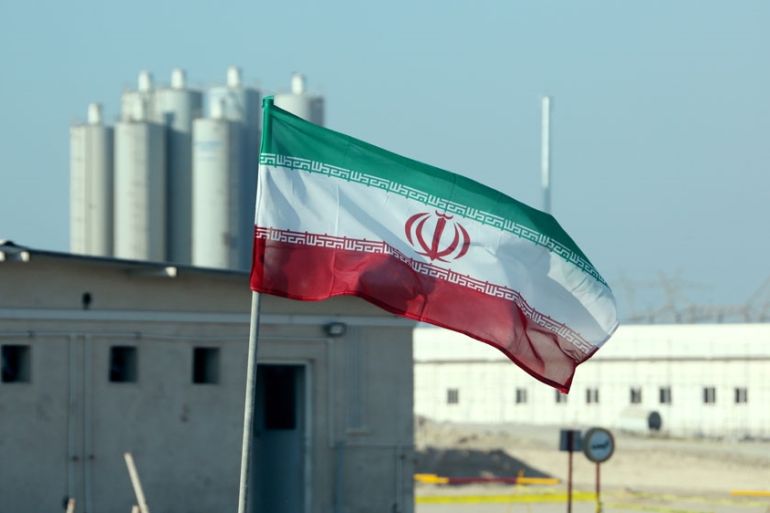Iran: Europeans hypocrites for condemning steps away from deal
Foreign Minister Zarif baulks at EU statement suggesting it has kept up its part of the bargain over the nuclear pact.

Iran accused European nations trying to salvage the moribund 2015 nuclear deal of hypocrisy for criticising and threatening to reimpose sanctions after Tehran took a major step away from the historic agreement.
Iran’s president and foreign minister on Tuesday said the UK, France, Germany, and the European Union have failed to uphold their end of the bargain to protect Tehran from “maximum pressure” sanctions imposed by the United States in the wake of Washington’s withdrawal from the deal in 2018.
Keep reading
list of 3 itemsIran begins constructing second nuclear reactor at Bushehr plant
Iran says enriching uranium to five percent
On Tuesday, President Hassan Rouhani said Iran only began scaling back its nuclear commitments a year after the US withdrawal to give the other parties time to uphold their pledges under the Joint Comprehensive Plan of Action (JCPOA).
“We waited for a year,” Rouhani told a televised news conference. “Nobody in the world can blame us by saying ‘why are you abandoning your commitments under the JCPOA?’
“This is a problem that the enemy has created for us,” he said, referring to Iran’s rival, the United States.
Iranian officials did not directly address a new report on Monday from the International Atomic Energy Agency (IAEA), the United Nation‘s nuclear watchdog, that said its inspectors detected uranium particles of man-made origin at an undeclared site in Iran.
Instead, they responded to the condemnation and threats to reimpose sanctions from the European countries over Tehran’s announcement last week that it started enriching uranium at its Fordow site – a facility built into the side of a mountain to protect it from any aerial bombardment. Tehran had concealed the site from UN inspectors until 2009.
Fordow is rapidly accelerating enrichment with a variety of advanced centrifuges also banned by the deal, IAEA said.
The European countries called the steps “inconsistent” with the accord, adding they’ve followed through with their pledges.
“The E3/EU have fully upheld their JCPOA commitments, including sanctions-lifting as foreseen under the JCPOA,” they said in a statement.
That prompted Iranian Foreign Minister Javad Zarif to respond on Twitter: “‘Fully upheld commitments under JCPOA’ YOU? Really?” he tweeted.
To my EU/E3 Colleagues
1."Fully upheld commitments under JCPOA"
YOU? Really?
Just show ONE that you've upheld in the last 18 months
2.Iran triggered-& exhausted-dispute resolution mechanism while you were procrastinating
We're now using para36 remedies
Look at my 6/11/18 letter pic.twitter.com/G6n4hwqS6s— Javad Zarif (@JZarif) November 12, 2019
Reimpose sanctions?
German Foreign Minister Heiko Mass on Monday threatened the use of “all the mechanisms laid down in the agreement” to make Iran comply with its obligations under the nuclear deal, which includes reimposing European sanctions.
Rouhani said Iran’s approach was to take “the path of resistance and perseverance” by reducing its commitments.
“We are negotiating with the world … They are giving us proposals, we’re giving them proposals. Up until today, I have not accepted the proposals I’ve been given,” he said.
Neither Rouhani nor Zarif referenced IAEA inspector’s discovery of uranium particles at an undeclared site in Iran. The particles are believed to be the product of uranium mined and that underwent initial processing, but not enriched.
The UK, France, Germany, and the EU said they were “extremely concerned” by the finding.
Iran’s envoy to the IAEA in Vienna, Gharib Abadi, said in a statement the UN watchdog had been given access to the site “with the utmost cooperation and clarification”.
“Any attempt to prejudge and present immature assessment of the situation would be aimed at distorting the facts for political gains,” said Abadi.
Snap-back
Under the terms of the 2015 deal, if any party believes another is not upholding their commitments they can refer the issue to a joint commission comprising Iran, Russia, China, the three European powers, and the EU.
If the complaining party cannot resolve the matter at the commission level, it could then notify the UN Security Council, which must vote within 30 days on a resolution on continuing Iran’s sanctions relief.
If this is not adopted within that time span, sanctions in place under previous UN resolutions would be reimposed – known as a “snapback” – unless the Security Council decided otherwise.
“We don’t want to pull out of the [deal] too soon, but equally we cannot sit back. The Russians and the Chinese are not going to trigger this, but us, as Europeans, will have to take a stance at some point,” said a European diplomat on condition of anonymity.
“It is not if but when, unless Iran pulls back, but even then, they are gaining [nuclear] knowledge by spinning these centrifuges, so we have to react.”
Diplomats said a meeting of the parties to the accord would take place over the next week to discuss latest developments. However, they say, the Europeans are unlikely to trigger the mechanism before January when Iran is due to announce its next round of steps away from compliance with the deal.
“What we’re now seeing is the dismantling of the JCPOA,” said another diplomat, also asking not to be named.